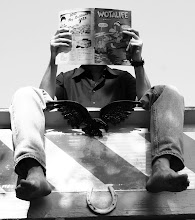
He wore a tiny, yellow plastic barrel on his collar, in which his vital statistics were stolen, his dog tag for feline invasions into foreign territory.
With his bright yellow shirt lapels direct from the wardrobe of James Brown, his stainless steel tiara the envy of any member of Parliament-Funkadelic, his prison-issue wrist bands and chain link belt, he was easily the most street-savvy and fashionable character in comics during the mid-1970s.
He was named for Septimius Severus, warrior emperor of the Roman Empire from 193 to 211, and for being born in the month of September.
I first stumbled upon him in issue fifteen of his monthly title, back when it was still known as Luke Cage, Hero for Hire. A black, ex-con, mercenary of justice, he was constantly fighting the system and “the man”, about as far removed from the generic superhero template as one could imagine.
Septimius was a sleek ribbon of stealth and attack, a dark dart in the eye of any rabbit too timid to flee, a lashing draft of claw to the sleeping dove, sated on seed.
Too young to have been visiting the theater to catch blaxploitation flicks like Shaft, and Dolemite, Cage was about as close as I came to experiencing the rough and tumble urban milieu of pimps, hookers, and racist cops. His comic fascinated me like no other.
There was no cat in the family tree like Septimius, not brash and strong Tom-Joe, not winsome, wide-eyed Suzie Wong, not noble, warm-hearted Ben, none could match Septimius for his feline prowess. He was the undisputed king of his terrain, and yours too if you weren’t careful.
To a newly-arrived, pre-teen English immigrant, the American inner-city alone was an exotic locale, one peopled with a litany of mesmerizing characters, so often the trope of marginal fiction. Any comic, or book, that offered me a glimpse into this strange world was an attraction, but nothing prepared me for the mother lode of badass histrionics to be found in the pages of “America’s First and Foremost Black Superstar!”, the spearhead of Marvel’s typically over-stated social out-reach campaign.
Seppi, as we came to know him, was nevertheless a loyal companion, in as much the way a cat can ever truly be. He would gaze upon your impatience with a patience of his own, sitting in the sun-baked door, waiting to be let out, or welcomed in. He seemed to recognize our shortcomings and he forgave us them.
Peopled with the likes of Albert “Billy Bob” Rackham, the rabbit-toothed, pig-nosed racist prison guard, who spouted the jargon of a white southern “cracker”, referring to Cage as “That crazy black boy”, spouting dialog as regressive as “Blast the chicken feed luck I been havin’! If that boy Lucas is still as hard-headed as he was at Seagate –”, the early issues of Hero for Hire were the equal of anything I might have seen in the cinema, parading both white and black stereotypes with a manic efficiency.
His eyes were the color of lemonade in a green glass, two luminescent buttons split by black Vs, grey, smoky dark petals that breathed with the advance of color and light, eminent portals that disappeared behind falling lids when the business of being a cat was done.
Interestingly, these initial stories were written and drawn by African-American creators, something I can only believe was Marvel’s attempt at legitimizing the content.
Seppi came with us to America, saying goodbye to the heather and the hills of rural southern Scotland. In a plastic bin he was pinned, hunched shoulder bones angry neo-wings upon his back, his neck long and taut, his sharp cheekbones like echoes of his piercing eyes, the life within him focused on the dark corner of his temporary, yet seemingly eternal cage.
That Hero for Hire ultimately had as little to do with reality as an episode of Welcome Back Kotter was beside the point, it was completely intoxicating to me, so much so that when, with issue seventeen, the title changed its name to Luke Cage, Powerman, and began exhibiting more standard super villain foes and storylines, I was (in a word I’d recently adopted) bummed, but not enough to give up on my favorite character, for he had already become an indelible part of the American cultural landscape I was so eager, and desperate, to embrace.
Septimius Severus Eaton, brother of Septimia Octavilla, a creature I never did see. Septimius, charge of my mother, the bearer of his unusually-distinguished name. Septimius, the pouncer of mouse, the slayer of shrew, the nuisance of untold generations of flies and moths. Loving, brutal machine Septimius.
Such a change in my comics-reading diet would have been hard to imagine, just a few short years prior, when I was still steeped in tea-stained British funny book fare like The Wizard and Hotspur, the America shown in their pages almost chiefly one of a historical nature, the Wild West being, by far, the most prominent in their oeuvre. But an epic plane journey across the Atlantic changed all of that.
You survived another move, didn’t you? This time in a cage that rocked in the back of a station wagon, a vehicle making its way south and west, to the cornfield stretches of Western Pennsylvania, the womb of the family farm, a glacial unearthing of brown grass and busy tree, a wild newness that would not long after become the address of your tomb.
On August 1, 1971, at Prestwick Airport, in Glasgow, Scotland, my family and I boarded a British Airways 747, bound for New York, a three thousand, two hundred and eleven mile-long flight, piloted by one Captain N. V. Bristow. Joining us on our ocean crossing were a rabbit, two goldfish, and a cat, a feline immigrant with short, inky fur, the creature who would, one late afternoon in the year 1976, rake his magnificent claws across the single-most prized component of my Power Man armory.
Go ahead, laugh if you will, show that you just don’t understand the conflicted hurt of my adolescent fury, its blinding hate and subsequent love for this blessed animal, the brother who had lowered his arms to walk the earth. Ultimately, my devotion to his existence offered me the space in my enraged heart to forgive him his trespass, when, in actuality, none had existed.
Forever dreaming of one day owing one of the classic spinning racks decorated with the omnipresent Hey, Kids, Comics! placard, the only genuine place to keep my comic book collection, safe from interested fingers and paws, I was left to devise strange substitutes, utilizing everything from the slats in my closet doors, to empty cereal boxes, always inventing new ways to store my ever-growing library of Marvel and DC titles, the garishly-colored totems that magic made from my pocket money, before the numbered eyes of the newsstand register.
By the summer of ’76, my Luke Cage collection had grown measurably. I had every issue from number fifteen up to number thirty-four, an impressive little archive of hormonal fantasy that I topped with perhaps the single most-loved comic in all of my four-color holdings, the unrivaled glory that was LUKE CAGE, POWER MAN ANNUAL #1, emblazoned with the ridiculously sublime physical theatrics of a Dave Cockrum cover.
How could I resist displaying this enviable treasury for all to see? How could I not set to laying these eighteen editions of pulp-hewn pleasure upon the living room floor, fanned out about the all-mighty Annual #1, like the multi-colored tail feathers of a peacock in heat? But, equally, how could I ever imagine this was a safe place to leave them, when the long summer nights left the screen door ajar, a space just enough to offer entrance to the warrior emperor, his hands full of knives?
So fierce was my anger, upon discovering the furry-tailed fiend, sprawled across the legacy of the man born Carl Lucas, the man framed with a pocketful of cocaine and sent to prison, the man who, infused with a bastard strain of the Super-Soldier serum, broke free, only to be hounded by the likes of Rackham, and others he’d squared shoulders with in the maximum security confines of Georgia’s Seagate Prison.
“Comings-together ain’t always time for rejoicing, children.”
– Luke Cage, Hero for Hire #15, November 1973, scripted by Billy Graham and Tony Isabella.
How I desired to thrash the life from Seppi, to punish him for doing only what he was designed to do, scratching away the dead outer layer of his claws, a task to which he’d entrusted the bright red cover of Cage’s first and only king-size annual.
Lacerated deep, with wounds that punctured through many pages, into the flesh of the spine-bound comic, the lower right half of the cover was in tatters, shreds of dialog and rippling muscle jettisoned across the carpet like the downy breast of an unlucky sparrow.
But those eyes, those beautiful, accepting eyes, their black Vs now big, round, dark aching orbs of forgiveness, forgiving me my stupidity, my lack of grace under loss, forgiving me my very humanity – how on earth could I stay angry with the breathing mantle of such divinity?
I love you, Septimius Severus Eaton, I love you still. May you have been shredding king-size annuals all the past twenty-two years since you left us, lying eternally in sunny contentment, the rays of heaven at your back.
























































